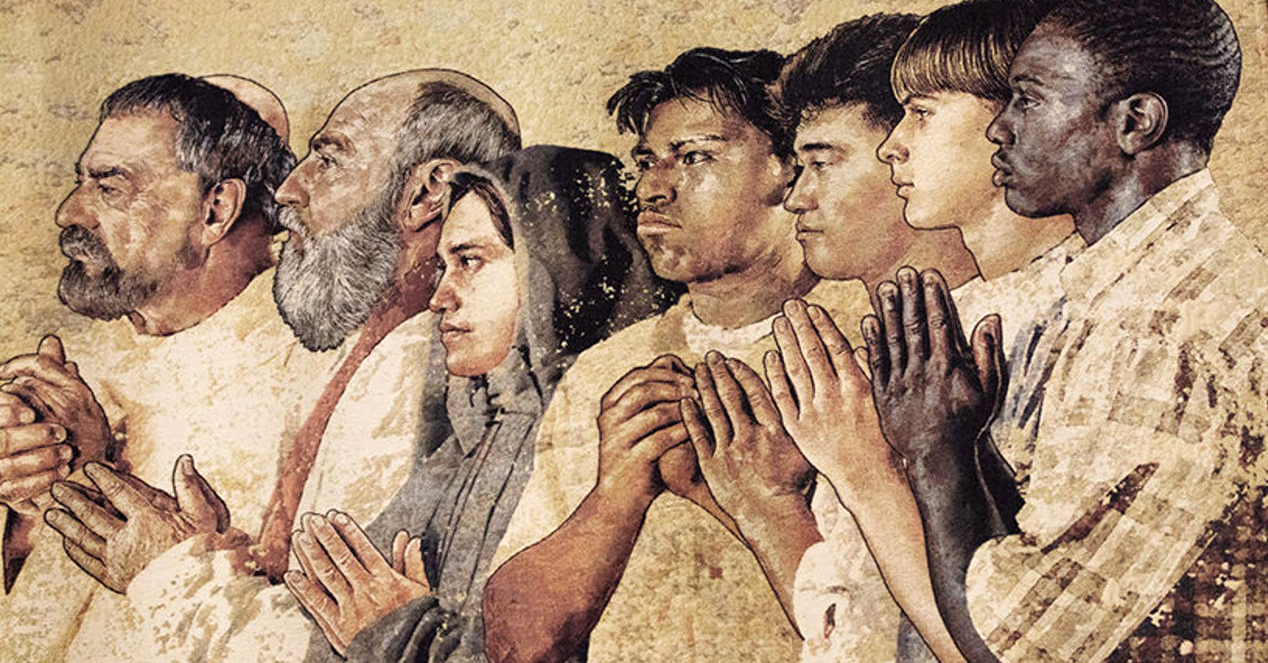
27 Nov November 2023 Reflection – Michael McFarland SJ
All Saints
November is the month when we especially remember those who have gone before us, beginning with the Feast of All Saints. This solemn celebration looks beyond those who have been explicitly recognized as Saints because of suffering they have endured, particularly martyrdom, or because of especially notable accomplishments. It recognizes the millions and millions of others who quietly have lived saintly lives, including many among us.
What makes someone a saint? “Saint” comes from the Latin sanctus, meaning holy, belonging to God. A saint is someone who is touched by the divine. It does not necessarily mean being outwardly pious; some are, but not all. It certainly does not mean being perfect. Real saints, more than most people, are acutely aware of their limitations and their sinfulness. Some have been notoriously difficult to live with. Because of their closeness to God, they are well aware of how far they fall short of God’s perfection. What sets the saint apart is a deep and intimately personal experience of God’s love and a willingness to embrace it in response. That relationship becomes the center of the saint’s life, the ultimate object of all desires and the guide to every action.
It is not that saints are withdrawn from the world, but that they see it as God sees it and love it with something of God’s love. They do not look to the world for gratification or fulfillment, but as a means to bringing them and the world closer to God. Their desire for the world, therefore, is what God desires: a world of justice, love and peace. This is the essence of the Beatitudes in Mt. 5, which is the Gospel for the Feast of All Saints. Those blessed by Jesus are the peacemakers, the merciful, those who hunger for justice and identify with the poor, the meek and those who mourn. Moreover, because they have put all their trust in God rather than what the world offers and because they are so deeply committed to God’s will, they are willing to sacrifice for it, even to the point of persecution, suffering and death. Christ’s final two blessings in the Beatitudes are for those who are persecuted for the sake of His righteousness. In the same spirit, the first reading for the Feast celebrates those who have endured persecution and martyrdom; they are the ones who gather around God in the Kingdom. This commitment to loving service of Christ and His will shapes the lives of the saints. Because of it their lives radiate strength, courage, mercy, kindness and a deep peace in the face of even the most severe challenges. Their witness assures us that Christ is still present and at work among us and in the Church, in spite of its struggles and failings.
Jesuit education is designed to produce such saints. It takes a serious and reverent interest in everything human and the physical world around us in all its richness and complexity, while also acknowledging the corrupting power of evil and sin. It helps its students understand their world and themselves through rigorous inquiry and critical thinking; and it helps them develop the other skills they need to be successful in whatever they undertake. But there is always a deeper purpose in this: serving the greater glory of God. Students are encouraged to develop a strong relationship to God in Jesus Christ and to discern and carry out God’s will in their own lives and beyond, working for a more just and peaceful world. We see the effects in the extraordinary lives of so many alumni, their generosity, devotion and joy, and the positive impact they have on their communities and the wider society. The power of this education is especially evident in the Gregorian University and its related institutes, which have produced 75 named saints and blessed and countless others who live holy lives shaped by the Beatitudes in service of Christ and His Church. They take students from every part of the world who are already committed to ministry in the Church and not only give them an in-depth knowledge of theology, social science and related subjects, but also develop the critical thinking, inquiry and communications skills they need to take a leadership role wherever they go. This is integrated with a Christ-centered spirituality and a commitment to openness, respect for all peoples, compassion and service, while building relationships that will last them for a lifetime. That is a big reason why their graduates stand out in their leadership and service and why these institutions are worthy of our support.
Michael C McFarland, SJ
President, Gregorian University Foundation



